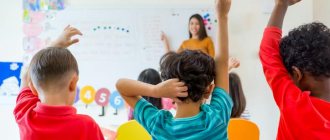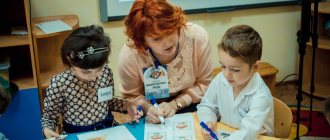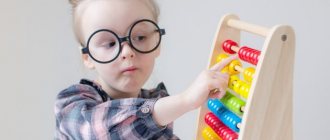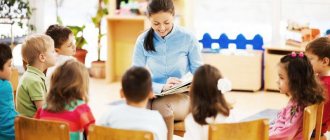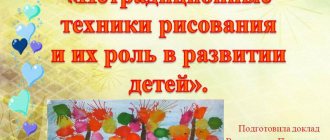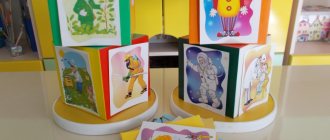Speech at the regional methodological association of preschool teacher
Zamyatina Olga
Speech at the regional methodological association of preschool teacher
Zamyatina Olga Viktorovna
Topic: Role-playing game as a means of social and communicative development of children of middle preschool age, using LEGO constructors
In connection with changes in the preschool education system, the scientific, methodological and material base of training and education . Requirements for child development change every day, new technologies appear, and traditional forms and methods are no longer able to interest modern children. One of the important conditions for updating is the use of LEGO technologies.
Design activity plays a significant role in the mental development of the child, promotes the psychophysical development of children, helps the development of communication skills, and develops the ability to cooperate with a partner in the process of teamwork. By creating something with his own hands from a LEGO constructor, a child embodies his ideas about the world around him in a real model of these objects .
Situations that arise in the process of creating buildings and playing with them contribute to the social and communicative development of children. In the process of creating models, children discuss and compare, agree, taking into account the partner’s opinion, and improve the models for subsequent play.
Role-playing game is the main type of play for a preschool child. The main components of a role-playing game are : an imaginary situation, a plot, roles. Among the main role-playing games typical for children of middle preschool age are: “Family”
,
“Bus”
,
“Trip on a Train”
,
“Shop”
,
“Hospital”
, etc.
At four years old, most children begin to explore the world around them on their own. A role-playing game helps in this difficult task. Play is one of the leading types of children's activities. In play, the child experiences not only positive emotions. He also experiences the bitterness of failure, defeat, dissatisfaction with the results achieved, resentment, etc. However, despite the presence in some cases of negative emotions and experiences, play always brings joy, pleasure, and enjoyment to the child. A game without joy ceases to be a game.
Incorporating role-playing games using LEGO construction sets helps preschoolers enter the world of social experience. Children develop a unified and holistic idea of the objective and social world. In the process of role-playing games using LEGO construction sets, the development of social and communication skills in children of middle preschool age is successful, since LEGO construction harmoniously combines construction and story-based play. L. A. Paramonova proposes to abandon the term “construction game”
saying that in the design process “... we are dealing either with a plot-role-playing game, which includes design elements that contribute to the development of the game plot, or with full-fledged design as an activity in which toys and game elements are used that positively influence the process design itself." In this work, we take a role-playing game as a basis, and the LEGO constructor will allow us to develop the game plot.
Despite the fact that the LEGO constructor has a large number of prerequisites for successfully helping to develop the social and communicative abilities of a child of middle preschool age, in practice this tool is not given enough attention, so work in a preschool educational institution using a LEGO constructor is very rare.
The use of LEGO constructors in OOD classes helps develop creativity and communication skills - as it involves not only discussion and comparison of individually created models, but also their joint improvement and transformation for subsequent play. We do not end children’s educational activities at the moment of construction - we invite them to play out this construction in a role-playing game. And what could be better than losing the game yourself with the result of your activities. Understand what was done well, what needs to be worked on, what needs to be refined and improved. What new types of buildings can be used to further enrich and develop the game. Developing the plot of the game with the help of a LEGO constructor is very interesting, because the bright and varied constructor will not leave any child indifferent.
Children are tireless designers, their creative abilities are original. This contributes to an interesting development of the plot in the game. LEGO construction helps a child bring his ideas to life, build and fantasize according to a plot set by the teacher. The child works enthusiastically and sees the end result. And any success stimulates the desire to learn.
It should be especially noted that role-playing games do not tolerate authoritarianism. "Control"
playing is only possible from the inside, when
the teacher himself enters the imaginary world of the game and unobtrusively offers the child new twists in the development of the plot. This is much more difficult than organizing a training session. You can teach the game only by playing. At the same time, the game itself does not arise without the help of an adult. An adult gives the child the necessary toys and material for creating substitute toys, thereby developing his imagination, helping him to see the same object from different “angles”
, it is he who helps children to establish interaction and relationships in the game.
Role-playing games using LEGO constructors have an excellent psychotherapeutic effect, since a child can unconsciously release accumulated negative experiences by completing one or another construction and playing with it. A role-playing game using LEGO constructors gives a special sense of social significance.
I would really like to draw the attention of teachers of other preschool educational institutions to role-playing games using construction sets, as another means of social and communicative development of children of middle preschool age. And actively use it in your direct educational activities, making suggestions, ideas, adopting work experience from teachers of other preschool educational institutions . This will help make role-playing games for children using LEGO constructors more advanced and applicable to the individual characteristics of their development.
1. Eastern administrative district. GBOU School No. 2036.
Topics of speeches:
1. “The role of the literary and art museum “Cheburashka Apartment” in the education of moral feelings of preschoolers,” teacher-organizer E. V. Zyukanova 2. “Moral and patriotic education of preschoolers through participation in the City Festival “Spiritual Bonds of the Fatherland,” educational psychologist Morozova E. N., teacher-speech therapist Manyukova S. V. 3. “Educational activities in the preparatory group “Journey to the man-made world of dolls”, teacher Shloma T. P., teacher-speech therapist Manyukova S. V.
The event materials can be found at the link: https://drive.google.com/drive/folders/1ex21dNXPyxYXn1cgacjgFe5V3nbo2snm?usp=sharing
2. Eastern administrative district. GBOU School No. 920.
Topics of speeches:
1. “The formation of spiritual and moral values is a priority task in the education of a modern preschooler,” senior teacher at GBOU School No. 920 Subbotina S. V. 2. “The role of the activity approach in the spiritual and moral education of preschoolers through children’s literature,” senior teacher at GBOU School No. 1637 Kizbabaeva M. V. 3. “Formation of moral values in preschool children when mastering financial literacy through children’s literature,” senior educator at the State Budgetary Educational Institution “Moscow International School” Dikur N. G. 4. “Use of fairy tales of the peoples of Russia for the formation of moral qualities among preschoolers", senior teacher of the State Budgetary Educational Institution "Moscow International School" Solomkina E. V. 5. "Education of spiritual and moral values of preschool children through literary and artistic activities", teacher of the State Budgetary Educational Institution School No. 920 Kosareva N. V. 6. "Reading fiction as a means of emotional and personal development of a preschool child", teacher of GBOU School No. 1637 Loseva I. I. 7. "Possibilities of a literary circle in the moral education of preschool children", teacher of GBOU School No. 920 Filimonova Yu. S. 8. "Development of children's creative abilities by means Literature and Music", teacher of GBOU School No. 920 Krymova U.A.
The event materials can be found at the link: https://drive.google.com/drive/folders/16DDkOFxNnijOzB049csSC9RfJk5gpuQU?usp=sharing
3. Western administrative district. GBOU School No. 1596.
Topics of speeches:
1. “Updating the topic of patriotic education in preschool education,” senior methodologist Zenkina I.V. 2. “Formation of state identity in preschool childhood: theoretical and practical aspects”, educational psychologist Nikonova K. Yu., senior teacher Kotova S. A. 3. “Forms of working with families on moral and patriotic education”, teacher-defectologist Grinchuk G. I., senior teacher Lemeseva N. N. 4. “Integrated lesson in a preparatory group for school on the topic “Travel around the globe”, teacher-speech therapist Karaseva S. G., teacher Ilyasova R. T., senior teacher Klimachkova M. E. 5. Master class on the topic “Games of the Nations of the World”, teachers Samarina O. A., Chubarova V. A.
The event materials can be found at the link: https://drive.google.com/drive/folders/16DDkOFxNnijOzB049csSC9RfJk5gpuQU?usp=sharing
4. Western administrative district. GBOU School No. 1432.
Topics of speeches:
1. “Practical updating of the content of the educational process on the social and communicative development of preschool children through the use of modern pedagogical technologies for the effective socialization of children in the conditions of the Federal State Educational Standard,” head of the preschool department T. N. Galkina 2. “Pedagogical technology “Club Hour” as a means of developing self-regulation of behavior in preschoolers ", teacher Vavilova V. A., senior teacher Borisova L. S. 3. "Technology "Reflective circle", teacher Efremova O. A., teacher-speech therapist Semenova S. P. 4. "Social action", "Children- volunteers" - technologies for familiarization with sociocultural norms, traditions of family, society and the state", educators Reshinskaya L. A., Dzyk S. N. 5. "Developmental communication technology", teacher-psychologist Melnikova N. A. 6. "Modern pedagogical technologies for the effective socialization of children as a condition for expanding family participation in the educational activities of the organization,” teacher Abramova S. A.
The event materials can be found at the link: https://drive.google.com/drive/folders/1qSGbCG_SB6k9xNfdVYxYPBk1WXqIrSV4?usp=sharing
5. North-Eastern administrative district. GBOU School No. 1577.
Topics of speeches:
1. “System of work on the social development of preschool children,” teacher Saverskaya E. Yu. 2. “Methodological recommendations for the organization of spiritual and moral values in preschool children,” teacher-organizer Ilyushina N. A. 3. “Patriotic education of children in interaction with family and society,” teacher Karshieva R. T. 4. “Interactive exhibition as a form of work on patriotic education in an educational organization,” teacher Malakhova N. N. 5. “Educational activities with children of senior preschool age on the topic “Bogatyrs” Russian Land”, teacher Khvostova E.V.
The event materials can be found at the link: https://drive.google.com/drive/folders/10-wsQE2aQ_gCn6Qej_MLf8SElHk98sLq?usp=sharing
6. North-Eastern Administrative District. GBOU School No. 281.
Topics of speeches:
1. “Formation of the foundations of spiritual and moral education of children in the preschool education system in accordance with the Federal State Educational Standard of Education,” senior teacher Sharkova O. A. 2. “Spirituality as the basis of family education,” family kindergarten teacher Simonova U. E. 3. “Spiritually -moral education in the system of correctional and developmental work with children with disabilities,” teacher-speech therapist Reshetnik O. V. 4. “Business game with elements of training with teachers on the formation of spiritual and moral values in preschool children,” teacher-psychologist Yushkina E. M. 5. “Project activity in the middle group on the topic “Toy - yesterday, today, tomorrow,” teacher Novikova G. A. 6. “Project activity in the senior group on the topic “Family through the eyes of children,” teacher Dmitrieva S. V. 7. Educational activities with children of the preparatory group on the topic “Grand Duke Alexander Nevsky - commander of Russia”, teachers Bobkova E. V., Slavgorodskaya T. A. 8. “Interactive fairy tale “Morozko”, teachers Lyubicheva I. A., Chekalova E. G., musical directors Mikhailova S. A., Krasnova I. A.
The event materials can be found at the link: https://drive.google.com/drive/folders/1qw8sZ36D5XNbg1sWIVE9BIvSWgWrbuTW?usp=sharing
7. North-Eastern administrative district. GBOU No. 1503.
Topics of speeches:
1. “Formation of spiritual and moral values in preschool children. Patriotic education of preschool children,” methodologist Labay O. V. 2. “Use of literary heritage in the moral and patriotic education of children,” teacher Velikaya E. A. 3. “Formation of tolerance and a sense of respect in children,” educators Filimonova V. G., Tsvetkova A. V. 4. “Joint work of the music director and teacher on the formation of patriotic feelings in children,” music director Vorobyova L. V. 5. “Project “Where the news comes from,” teachers Filimonova V. G., Tsvetkova A. . IN.
The event materials can be found at the link: https://drive.google.com/drive/folders/1MKSCxw5wgpilRBRaBTZSA5jttFF50fcC?usp=sharing
8. North-Eastern Administrative District. GBPOU "1st IOC".
Topics of speeches:
1. “Formation of spiritual and moral values in preschool children”, senior teacher Mamelina Yu. V., teacher Gavrilova N. F. 2. “Mini-museum as a means of spiritual and moral education of preschool children”, teachers Aldokhina G. A., Simonyan M. K. 3. “Pedagogical technology “Club Hour”, teacher Zhilina N. E. 4. “Analysis of a work of art within the framework of patriotic education of preschoolers,” speech therapists Osipova M. V., Moiseeva A. M. 5. “Game modeling: speech therapy fairy tale as a means of developing moral qualities in preschool children,” speech therapist teacher Selina E. A., Barbosova N. N. 6. Training “Let’s sow kindness in children’s souls,” teachers Guseva I. A., Zhuravleva E. V. 7. Master class “Making a baby book”, teachers Rubanovskaya L. A., Kirishchenko I. A.
The event materials can be found at the link: https://drive.google.com/drive/folders/1hH2qLEkqIWksGT_4XWEG-cYn47GjwxKX?usp=sharing
9. North-Eastern Administrative District. GBOU School No. 1449.
Topics of speeches:
1. “Modern technologies for the effective socialization of preschool children. Club hour,” senior methodologist Burkova E. G. 2. “Pedagogical technology “Situation of the month” as a means of positive socialization of preschoolers in an educational organization,” teacher Krutyakova N. S. 3. “Development of social and communicative competence of older preschoolers in the process of implementation technologies “Daily reflective circle”, teachers Obogueva L.V., Merzlikina E.M. 4. “Club hour “Zoo”, teachers Proskurnina A.N., Zhuravleva E.V.
The event materials can be found at the link: https://drive.google.com/drive/folders/1h_raBaXWjzHBBJ5AOfscgpq3SHR5wjSz?usp=sharing
10. North-Eastern administrative district. SAOU School CHIC 16.
Topics of speeches:
1. “Federal State Educational Standard for Preschool Education. Formation of spiritual and moral values in preschool children,” senior methodologist Kovalenko O. V. 2. “Resource circle as a means of working with younger preschoolers and their families. “Affectionate song”, teacher Bryazgalo O. G. 3. “Project “Warmth of the Hearth”, teacher Roshchina L. N. 4. Entertainment for children of senior preschool age “Journey of the Heroes”, methodologist Korovochkina V. M., teachers Smirnova V. A., Noginova I. N.
The event materials can be found at the link: https://drive.google.com/drive/folders/1k7DyVM_NSZAkBHbDgwy0pPZ5ermpsWws?usp=sharing
11. North-Eastern Administrative District. GBOU School No. 285.
Topics of speeches:
1. Research project “Who are volunteers?”, educator T. V. Lobaeva 2. Presentation of experience in patriotic education on the topic “I know! I remember! I’m proud!”, teacher Manukyan G. N. 3. “Education of an inclusive culture and humane relations in preschool children”, teacher Yuzefovich E. V.
The event materials can be found at the link: https://drive.google.com/drive/folders/1UiieIFOdyen3yyKqrLgkCDSugOSaulTX?usp=sharing
12. North-Eastern Administrative District. GBOU School No. 709.
Topics of speeches:
1. “Development of moral and spiritual values based on pedagogical technology for raising children 5–8 years old in the spirit of tolerant communication “Stories of little ones: how to live in peace with yourself and others,” educational psychologist Gerasimova E. A.
2. “Early career guidance as a component of spiritual and moral education,” teacher Belyavskaya A.V.
3. “Introducing children to cultural heritage: introducing preschoolers to the professions of craftsmen,” teacher Shishkina T. A.
The event materials can be found at the link: https://drive.google.com/drive/folders/1vQUlR0ys3i9YcpYKGxAOqbgd8hj8C_D6?usp=sharing
13. North-Western Administrative District. GBOU School No. 1560.
Topics of speeches:
1. “Spiritual and moral development of a preschooler as the basis of civic identity,” methodologist Zabrodina N. A. 2. “Variability of forms of organization of child-parent interaction in the formation of spiritual and moral values through art technologies,” educators Seliverstova T. L., Selezneva S. V., Morozova N. S. 3. “Volunteer movement “On the Road of Good”, educators Bolotina S. A., Gvozdeva N. A. 4. Educational activities of children of senior preschool age: - Summary of integrated educational activities in preparatory school group on the topic “The Good World of Fairy Tales”, teachers Volodina T. Yu., Anaskina O. V.; — Summary of educational activities in the preparatory group for school on the topic “Hurry to do good,” teacher-speech therapist Sabirova L.M., educational psychologist Musaelyan N.Yu.; — Summary of educational activities in the senior group on the topic “Our army is strong - it protects the world,” educational psychologist E. A. Zubkova, teacher S. V. Prokopova; — Summary of integrated educational activities in the senior group on the topic “My Motherland is Russia,” music director O. V. Vdovenko, teacher I. V. Evdokimova.
The event materials can be found at the link: https://drive.google.com/drive/folders/17am8ZmhkfeOvCM8O-jzmvOFoOikoJyLD?usp=sharing
14. Southern Administrative District. GBOU School No. 1034.
Topic:
1. “Quest game “Our Army” with children of senior preschool age”, teacher-organizer E. S. Shabalina, teacher-defectologist Efremova T. I., teachers Ilyina S. S., Kholodik M. Yu.
The event materials can be found at the link: https://drive.google.com/drive/folders/10hKVP37hG3KvxYhV9cZkSGZjhqSnZHAO?usp=sharing
15. Southern Administrative District. GBOU School No. 870.
Topics of speeches:
1. “Volunteer movement in preschool groups of an educational organization,” senior teacher Emelyanova M. V. 2. “Project activities with preschool children “Bright Easter” (work experience in spiritual education),” teachers Nechaikina M. N., Semina V. N. 3. “Russian folk doll is a means of introducing children to the culture of their people,” educators Kulakova V.P., Polikarpova S.V. 4. Master classes: — “Making napkins based on folk embroidery,” educator Solovyova O. . IN.; - "Russian traditions. Protective doll”, teachers Zmeeva E. S., Kirillova O. V., Sinelnik M. V.
The event materials can be found at the link: https://drive.google.com/drive/folders/1rPwjofcqJcJ0w0OQfOcxB_Z7JdDGkAdD?usp=sharing
16. South-Eastern Administrative District. GBOU Gymnasium No. 1321.
Topics of speeches:
1. “Formation of spiritual and moral values in preschool children,” senior teacher Chagina T. V. 2. “Cultivating tolerance is one of the areas of spiritual and moral education,” senior teacher Pritychenko L. V. 3. “Where the Motherland begins ?”, teacher Lyakhova Yu. V., teacher – speech therapist Davidyuk I. A.
The event materials can be found at the link: https://drive.google.com/drive/folders/1pMMUAY1ZKcyFTMMfwFniLVsKOXlThFlH?usp=sharing
17. South-Eastern Administrative District. GBOU Gymnasium No. 491.
Topics of speeches:
1. “Federal State Educational Standard for Preschool Education. Formation of spiritual and moral values in preschool children,” teacher Bragina I. Yu. 2. “My hometown is Moscow. We are a part of yours, Russia,” teacher Mukhametshina N. Sh. 3. “Formation of the foundations of ecological culture in the process of becoming familiar with nature,” teacher Bodyagina L. A., senior teacher Rogova N. P. 4. “Spiritual and moral education of preschool children in the process of becoming familiar with the social significance of the work of adults,” speech therapist S. V. Gaivoronskaya 5. Scenario for the “Moscow Lace” concert, music director E. V. Nikiforova.
The event materials can be found at the link: https://drive.google.com/drive/folders/13lKmDpKgxfYqnPxhgyvRHwnuEMfbJ9YB?usp=sharing
18. South-Western Administrative District. GBOU School No. 1492.
Topics of speeches:
1. “Spiritual and moral education in preschool groups of an educational organization,” senior teacher Bakotina S. B. 2. “Technology for effective socialization of preschoolers “Reflective Circle,” teacher Salnikova A. A. 3. “Relationship of the spiritual and physical development of the child,” teacher Gladkova Yu. V. 4. “Project activities for patriotic education”, teacher Ustinova I. A. 5. “Fairy tale as a means of spiritual and moral education of a preschooler”, teacher Kholina Yu. V.
The event materials can be found at the link: https://drive.google.com/drive/folders/16ADKrbRV1zFj1Qjb8ehIywHWEDA1IUo4?usp=sharing
19. South-Western Administrative District. GBOU School No. 2109.
Topic:
1. “Spiritual and moral education of preschoolers in thematic planning”, teacher Nicheporuk N. E. 2. “Formation of moral and patriotic feelings in project activities during the thematic week “I am walking around Moscow”, teacher Golda N. M. 3. “Familiarization with the culture and traditions of different peoples as a means of spiritual and moral education of older preschoolers within the framework of interaction between children, teachers, parents during the “Friendship of Peoples” week, teacher S. F. Avanesyan, music director N. N. Misnikova 4. Creative meeting on the topic “ Gender education in joint activities of schoolchildren and preschoolers: cadets and noble maidens visiting preschool children,” additional education teacher V. Yu. Akatieva, teacher A. A. Karnatskaya.
The event materials can be found at the link: https://drive.google.com/drive/folders/1BS_GrBUFWeMyzTXL2y-8_2IU2PJ_wCMM?usp=sharing
material for presentation at the method association
teacher of the structural unit "Kindergarten No. 10 of a combined type" MBDOU "Kindergarten "Rainbow" of a combined type" of the Ruzaevsky municipal district
Sadykova Matryona Aleksandrovna
Exhibition dedicated to the week of our native land “There is no more beautiful than our Motherland” Purpose: To introduce children to arts and crafts, the traditions of the Mordovian people, familiarization with customs and national costume, embroidery, color and originality.
Raising a citizen and patriot who knows and loves his homeland is a task that is especially relevant today and cannot be successfully solved without a deep knowledge of the spiritual wealth of one’s people. The need to introduce children to national culture is interpreted by folk wisdom: ours today, like never before, our past, also creates the traditions of the future. What will our descendants say about them? Our children should know well not only the history of the Russian state, but also the traditions of national culture, be aware of, understand and actively participate in the revival of national culture; to self-realize oneself as a person who loves his homeland, his people and everything connected with Mordovian culture, from which children draw Mordovian morals, customs, and the Mordovian spirit of freedom and creativity. The process of cognition and assimilation should begin as early as possible, as the people figuratively say: “With mother’s milk, a child must absorb the culture of his people through lullabies and nursery rhymes. Looking at the Mordovian national costume, children see the color and originality of the Mordovian people.
Mordovian folklore is a unique, original culture of our ancestors, which is recognized by modern society as a significant factor in spirituality, continuity of generations, and familiarization with vital national origins. It is better to start getting acquainted with folklore from an early age, since young children quickly and more actively absorb new, interesting, and useful material for them. The inexhaustible source of traditional folk culture makes it possible to find various ways to optimize the process of educational and developmental education for schoolchildren, helps solve the problems of moral and aesthetic education, and develop the creative abilities of the younger generation. Familiarization with the traditions of Mordovian folklore should be presented in a form accessible to students, the age characteristics of children should be taken into account, therefore it is rational to use the so-called “Children’s folklore”, replete with games, fairy tales, nursery rhymes, teasers and other small folklore genres.
Publication address:
